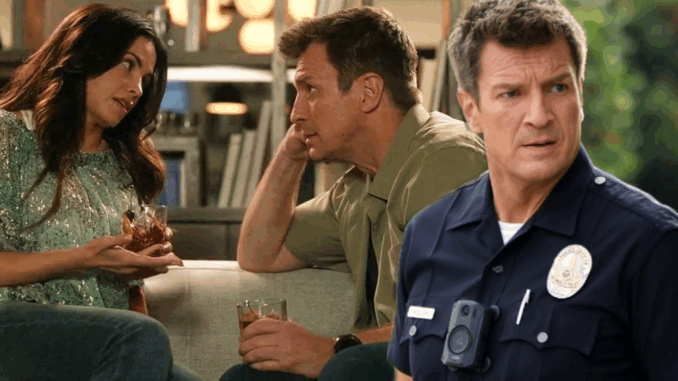
Few network dramas have been as daring in their later seasons as The Rookie. Since its premiere in 2018, the Nathan Fillion-led series has carved out a space in the crowded world of police procedurals by blending heart, humor, and high-stakes action. But in recent seasons, the show has experimented with something new — a documentary-style format that changed how the stories were told.
Suddenly, viewers weren’t just following scripted scenes. They were “inside” the precinct, with handheld cameras tracking tense arrests, raw emotional confessions breaking the fourth wall, and chaotic, unscripted-feeling sequences that mirrored the unpredictability of real-life policing.
The reaction? Divided. Some fans praised the boldness. Others questioned whether the format was pulling too much attention away from the heart of the series: its characters.
Now, as Season 8 approaches, the debate continues. Should The Rookie keep this risky style, or abandon it altogether? The answer isn’t simple — but with adjustments, the show could turn controversy into creative success.
A Bold Shift for a Steady Series
For most of its run, The Rookie has been a classic police procedural with a twist: following John Nolan, the oldest rookie in LAPD history, as he reinvents his life in his 40s. This premise gave the show an immediate hook — a mix of “fish out of water” comedy, heartfelt storytelling, and traditional cop drama pacing.
But by Season 6 and 7, the writers faced a challenge familiar to all long-running network shows: how do you keep things fresh without alienating fans? The answer came in the form of stylistic experimentation.
Episodes began leaning into a mockumentary-meets-reality-TV feel. Cameras followed officers during busts, traffic stops, and hostage negotiations. Characters occasionally addressed the audience directly, creating moments of striking intimacy. For a procedural genre often criticized for being formulaic, this was a shot of adrenaline.
Why Fans Loved It
For some viewers, this documentary-inspired lens was a revelation. The handheld camerawork and confessional interviews stripped away polish and created an almost urgent, fly-on-the-wall experience.
- Heightened Tension: Action scenes, already a strong point of The Rookie, felt even more immediate. Chase sequences carried an edge of unpredictability, as if viewers were right there alongside the officers.
- Character Depth: When Lucy Chen or Tim Bradford looked into the camera, admitting fears or frustrations, it gave fans moments of honesty that typical dialogue scenes couldn’t capture.
- Realism: In an era where audiences are skeptical of “glossy” TV portrayals of law enforcement, this raw style mirrored bodycam footage or ride-along documentaries, lending authenticity to the show’s world.
For fans craving something different from the procedural formula, this was a welcome shake-up.
Why Others Hated It
Of course, not everyone was convinced. The criticism was equally strong, and in some cases, louder.
- Pacing Problems: The reliance on quick cuts and interview-style breaks disrupted the natural rhythm of the episodes. Some arcs felt fragmented, preventing emotional beats from landing.
- Overuse of Gimmicks: Instead of enhancing the story, critics argued, the style became the story. It sometimes felt like the format was shouting for attention rather than serving the plot.
- Loss of Original Appeal: Longtime fans who fell in love with the show for its humor, grounded character work, and heartwarming moments worried that the experimental lens stripped The Rookie of its identity.
Online fan forums reflected this division. One camp begged for the format to be permanent; another wanted it scrapped entirely. The show, ironically, became a victim of its own ambition.
Lessons from Other Series
The Rookie isn’t the first procedural to take a stylistic risk. Shows like Brooklyn Nine-Nine flirted with mockumentary elements, while Grey’s Anatomy has experimented with narration-heavy episodes or non-linear storytelling. Even The Office proved that breaking the fourth wall can create intimacy — if used carefully.
The lesson is clear: bold formats can work, but only if they complement, not overshadow, the story.
What Season 8 Needs to Do
If The Rookie wants to keep this divisive format in Season 8, refinement is key. Here’s what needs fixing:
- Selective Use: Instead of applying the style to every episode, reserve it for arcs where tension and realism benefit from the format — hostage standoffs, high-stakes undercover work, or cases with moral ambiguity.
- Character First: Ensure confessional-style moments add to character development rather than repeat exposition. Viewers want to learn something new about Nolan, Chen, Harper, or Bradford when they “look into the camera.”
- Balance with Original Tone: Keep the heart, humor, and mentorship dynamics that made the show popular in the first place. The documentary lens should be seasoning, not the main dish.
- Stronger Transitions: Smooth out pacing by blending traditional storytelling with documentary sequences more seamlessly, so episodes don’t feel chopped into pieces.
Handled correctly, Season 8 could find the sweet spot — keeping the freshness without losing the soul of the series.
Why It Deserves Another Chance
It would be easy for the writers to abandon the experiment entirely. But doing so might be a mistake. The Rookie has always thrived by defying expectations — whether it’s following a 40-something rookie cop, or letting humor and heart soften a police procedural.
The documentary-style format, polarizing as it may be, shows the creative team’s willingness to take risks. In an industry where many procedurals stick to safe formulas, this ambition stands out. With adjustments, it could even become a defining element of the series.
Season 8 offers an opportunity: not to erase the controversy, but to prove that the chaos can be shaped into something powerful. If the balance is struck, The Rookie could remind fans why they fell in love with the show in the first place — while showing there’s still plenty of innovation left in a network drama.
